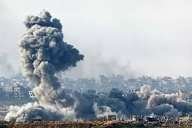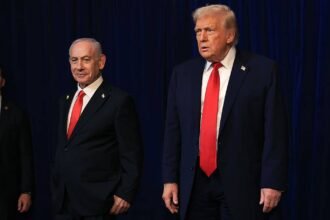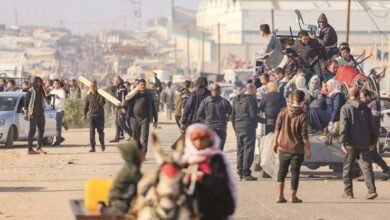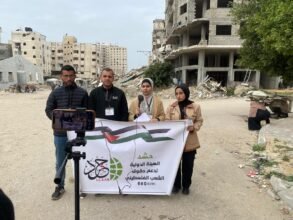
ICSPR: The Occupation Continues Its Slow Genocide, Starvation, and Targeting of UNRWA… Calls for International Protection and Comprehensive National Consensus to Manage the Post-Genocide Phase
Date: Saturday, 25 October 2025
Press Release
ICSPR: The Occupation Continues Its Slow Genocide, Starvation, and Targeting of UNRWA… Calls for International Protection and Comprehensive National Consensus to Manage the Post-Genocide Phase
The International Commission to Support Palestinian Rights (ICSPR) affirms that the Israeli war on the Gaza Strip has not truly ceased despite the declared ceasefire. Instead, it has transformed into a slow genocide managed through tools of blockade, starvation, the obstruction of aid, and the collapse of the health system — amid Israel’s ongoing evasion of its international legal and humanitarian obligations and its continued imposition of a slow-death policy on over two million people in the Strip.
ICSPR points out that the occupation authorities still refuse to reopen the Rafah Crossing and allow in less than 20% of the needed humanitarian aid, leading to the deepening of widespread famine and the continued loss of lives daily due to hunger, disease, and sporadic shelling. The occupation also obstructs medical evacuation for over 15,000 wounded and sick individuals who need treatment outside Gaza, which now suffers from the near-total collapse of health services and the lack of medicines, safe drinking water, and shelters.
According to the Palestinian Ministry of Health, the death toll since 7 October 2023 until the evening of Saturday, 25 October 2025, has reached 68,519 martyrs and 170,382 injuries, including 93 martyrs, 324 injuries, and 464 bodies recovered since the ceasefire announcement. An additional 220 martyrs have been confirmed after the completion of their documentation by the special judicial committee on the missing, and 64 mutilated bodies have been identified among the 195 bodies recently returned by the occupation.
ICSPR warns of an imminent environmental and health catastrophe caused by the accumulation of over 65 million tons of rubble, thousands of unexploded bombs and missiles, and other war remnants — while Israel continues to ban the entry of heavy machinery and equipment needed to remove debris and recover bodies. This situation renders the Gaza Strip a ticking environmental and humanitarian time bomb threatening civilian life on every level.
The Commission condemns the continued ban on the entry of journalists, technical teams, equipment, tents, and essential goods, while most of the few trucks allowed in carry commercial goods that residents cannot afford amid widespread poverty, unemployment, and the destruction of economic infrastructure — further deepening the famine and humanitarian collapse.
ICSPR also strongly condemns the U.S.-Israeli campaign against UNRWA, viewing it as an extension of the genocide through political and economic means aimed at eliminating the refugee issue and stripping refugees of international protection. The Commission notes that U.S. Secretary of State Marco Rubio’s statements rejecting UNRWA’s role in aid distribution contradict international law, the advisory opinion of the International Court of Justice, and Article 8 of President Donald Trump’s plan to end the war on Gaza, which stipulates that aid must be delivered through the United Nations and its specialized agencies.
ICSPR stresses that this stance demonstrates blatant disregard for international law and represents an attempt to impose political guardianship over humanitarian relief and refugees, in clear violation of UN General Assembly Resolution 302 (1949) and recent ICJ rulings emphasizing Israel’s responsibility to protect civilians and ensure unrestricted humanitarian access.
ICSPR welcomes the efforts of mediators seeking to consolidate the ceasefire and achieve humanitarian stability in Gaza, particularly the sincere efforts of the Arab Republic of Egypt, led by President Abdel Fattah El-Sisi, in sponsoring comprehensive Palestinian dialogue. The Commission commends the statement issued after the meeting of Palestinian factions in Cairo, which included agreement on managing the transitional phase and restoring national unity based on partnership and democracy. ICSPR considers this meeting an important step toward formulating a unified Palestinian vision for managing the transitional phase with a spirit of national unity, rejecting any attempts to impose external guardianship on Gaza, and reaffirming the unity of land, people, and destiny — while opposing any approaches that undermine the Palestinian people’s right to self-determination or contradict relevant UN resolutions.
The International Commission to Support Palestinian Rights (ICSPR) calls on the United Nations, the High Contracting Parties to the Geneva Conventions, and the free peoples of the world to uphold their legal and moral responsibilities to end the occupation, prosecute Israeli war criminals before the International Criminal Court, and stop the double standards that enable ongoing impunity.
ICSPR reiterates that the occupation is the root cause of all suffering, crimes, and violations, and that its end — along with the accountability of its leaders — constitutes the true path to a just peace. The Commission renews its call upon the international community, the United Nations, and all states and free peoples of the world to work toward:
- Providing urgent international protection for the Palestinian people through a UN Security Council or General Assembly resolution under the “Uniting for Peace” framework — with clearly defined mandates and authority — within the context of ending the occupation and protecting civilians.
- Lifting the blockade and opening all crossings immediately, especially Rafah Crossing, ensuring the unrestricted entry of aid, the evacuation of the wounded, and the entry of tents, equipment, journalists, and humanitarian teams into Gaza.
- Empowering UNRWA to fulfill its humanitarian mandate, ensuring sustainable funding, and rejecting any attempts to undermine its role.
- Holding Israeli leaders accountable before the International Criminal Court and national courts for genocide crimes, imposing sanctions and promoting boycott measures against the occupation state.
- Achieving comprehensive Palestinian national unity to end division and establish a unified leadership for reconstruction and early recovery based on justice and accountability, while pursuing efforts to rebuild the Palestinian political system on democratic foundations and agreeing on a unified national strategy under the framework of the Palestine Liberation Organization (PLO) — ensuring the consolidation of all efforts toward realizing the Palestinian people’s goals of return, self-determination, and the establishment of their independent state with Jerusalem as its capital.





